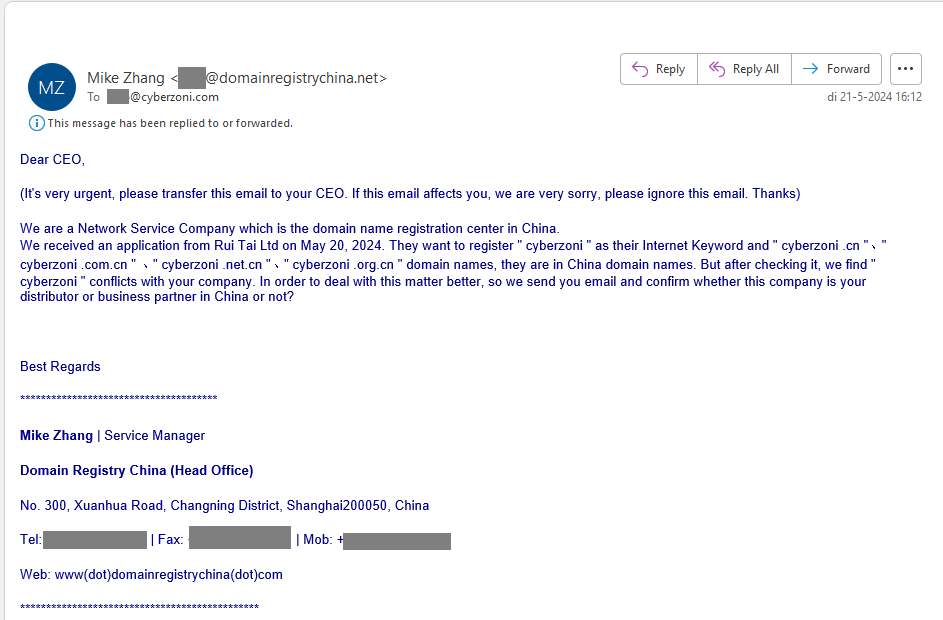Chinese Domain Name Scams: We Responded So You Don’t Have To

In this Article
Chinese Domain Name Scams
Recently, our company received a dubious email from an alleged “Domain Registry” in China, claiming another company wanted to register domain names similar to ours. Recognizing potential fraud, we responded to investigate and document their tactics. This article details our findings and offers practical advice to help you recognize and avoid these scams.
Chinese Domain Registrar Spam
The scam originating from China involving domain name registrations is a striking example of how cybercriminals adapt their strategies to target businesses globally. These frauds often masquerade as urgent communications from fictitious, authoritative sources claiming to be domain registrars based in China.
Chinese Domain Scam Explained
The email in question originated from what appeared to be, at first sight, a legitimate entity, self-described as the “Domain Registry China,” based in Shanghai. The sender claimed that a company named Rui Tai Ltd had expressed intent on May 20, 2024, to register several domain names that were strikingly similar to our own business’s trademarked name. These included variations like “cyberzoni.cn”, “cyberzoni.com.cn”, “cyberzoni.net.cn”, and “cyberzoni.org.cn”.
The urgency in the email was palpable. It implored us to act swiftly to resolve what it framed as a potential conflict over our online identity. The sender requested immediate confirmation on whether Rui Tai Ltd was associated with our company as a distributor or business partner in China. The underlying message was clear: failure to act might result in losing control over domain names closely tied to our brand, which could be registered by another party if we did not respond promptly.

This tactic is a classic hallmark of domain name scams. It plays on the fear of losing business legitimacy and the urgency to protect one’s brand, prompting hasty decisions that could lead to financial loss or unnecessary conflict resolution measures.
Grasp Domain Name Scams
To further investigate the domain name registration scam and understand the scammer’s operations, we replied to the initial email, expressing interest in knowing more about the proposed registrations without revealing any sensitive company information.

The response from Zhou Bao Hua, the alleged Managing Director, stated their intention to proceed with registering multiple “cyberzoni” domain names under various Chinese extensions, such as cyberzoni.cn and cyberzoni.com.cn. They indicated that these domain names were critical for their operations in China and that they were moving forward despite a suggestion from “Mr. Mike” to consider an alternative name. This indicated a push to create a scenario where immediate action seemed necessary to protect our business interests.
Following this exchange, we responded again to probe further into their operations and to see if they would reveal more about their registration process or introduce a financial request directly. As of now, we have not received a response to our latest e-mail. We will update this article with any new developments to provide a more understanding of the scam’s full scope.
Domain Name Scams
Noticing the warning signs of a domain name registration scam is important for businesses to protect themselves. The interaction with the alleged Domain Registry of China highlighted several key indicators that are commonly associated with such frauds:
- Questionable Domain Name: The initial email was sent from a .net domain rather than the .com that would be expected from a legitimate business entity, further casting doubt on the authenticity of the communication.

- Suspicious Email Signature: The email signature included a URL written with “(dot)” instead of an actual “.” (e.g., “www(dot)domainregistrychina(dot)com”), attempting to bypass spam filters while mimicking a legitimate site, which is a common tactic in phishing attempts.
- Unsolicited Communication: The initial contact from the scammer was unsolicited, with no prior relationship or correspondence, which is often the another red flag in many types of business scams.
- Urgency and Pressure: The emails exerted pressure to act quickly to resolve a supposed conflict or registration issue. Scammers use urgency as a tactic to compel victims to act without due diligence.
- Vague or Ambiguous Language: The correspondence from Zhou Bao Hua was marked by vague details about the necessity of the registrations and the lack of specific information about the legal or business implications of the alleged registrations.
- Lack of Direct Solicitation (Initially): Interestingly, the scam did not initially ask for money directly, which can make it harder to identify as a scam. However, the setup suggests that a financial request was likely forthcoming, particularly after establishing a correspondence line.
- Impersonal and Generic Messages: Although the emails appeared somewhat custom, they still had a generic tone, which is typical of scams aiming to reach a broad audience with minimal customization.
Staying Informed and Prepared
By sharing our experience and the detailed interactions with the scammer, we aim to raise awareness about the sophistication of these schemes and the importance of awareness.
The absence of an immediate response to our latest query does not mark the end of this issue. Scammers often operate in cycles, revisiting potential targets after initial contact. Therefore, we will be updating this article with any new developments or follow-up communications from the scammer.
We hope this article was informative, arming you with the knowledge to recognize and react appropriately to potential scams.
Stay safe, and keep your business secure. We encourage you to share this article with your network to spread awareness and protect others against similar deceptive scams.